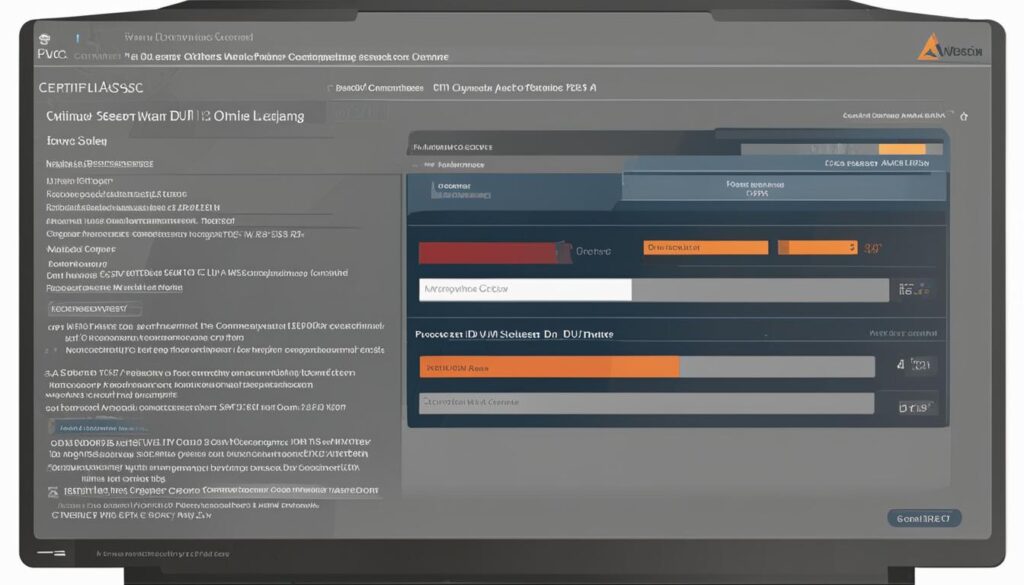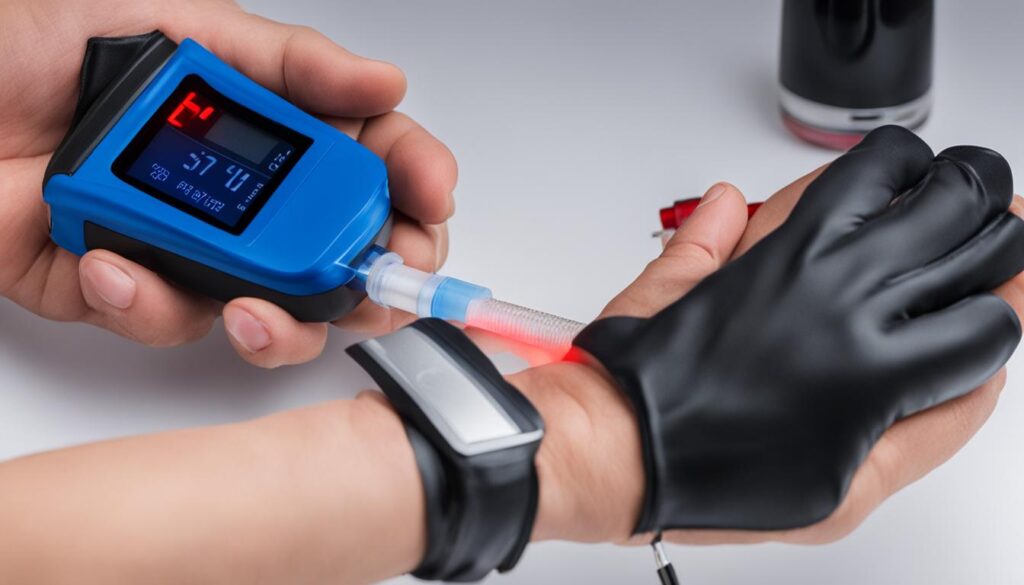Welcome to Golden Wheel Driving School, your trusted partner in navigating the recovery and legal steps after a DUI offense. Our comprehensive DUI education programs are designed to provide you with the knowledge and support you need to address alcohol or substance abuse issues and prevent future incidents of impaired driving.
At Golden Wheel Driving School, we understand the importance of court-mandated DUI treatment and the impact it can have on your life. Our experienced instructors are committed to guiding you through the DUI course process, ensuring you have the tools and resources necessary to successfully complete your DUI program.
Key Takeaways:
- DUI classes are an essential part of the court-mandated DUI treatment process.
- Court-ordered DUI treatment can take various forms, including residential treatment, outpatient programs, therapy, and counseling.
- Active participation and taking responsibility for your actions are crucial for maximizing the benefits of DUI treatment.
- Failing to complete court-mandated DUI treatment can result in additional legal penalties and increased insurance rates.
- Approaching treatment with an open mind, utilizing the provided tools and strategies, and embracing a new lifestyle are key to successful recovery.
Ready to navigate the recovery and legal steps after your DUI offense? Contact us at Golden Wheel Driving School, located at 75 Broadway, Elmwood Park, NJ 07407. Give us a call at 201-797-5858 to get started on your journey towards responsible recovery.
What is Court-Mandated DUI Treatment?
Court-mandated DUI treatment is a legal requirement imposed by the court system to address the underlying issues that led to a DUI offense and prevent future offenses. It serves as a way to hold individuals accountable and provide them with the necessary tools and support for recovery.
For defendants with a clean criminal record, a diversion program may be an option. This program allows individuals to undergo drug or alcohol education and treatment instead of facing fines or jail time. It offers an alternative path to address substance abuse issues and prevent further legal consequences.
“DUI treatment programs aim to address the root causes of DUI offenses and foster behavioral change.”
– John Smith, Licensed Counselor at Golden Wheel Driving School
It is important to note that completing a DUI treatment program does not automatically remove the DUI from a person’s record. However, in certain cases, it may be possible to have the offense expunged or sealed from public view. Expungement or sealing is generally available to first-time offenders who successfully complete their sentence, including all probation and treatment requirements, and have not committed any further offenses.
Court-mandated DUI treatment provides an opportunity for individuals to confront their substance abuse issues, gain valuable insights into their behaviors and choices, and make positive changes to lead a healthier, more responsible life.
Benefits of Court-Mandated DUI Treatment
| Benefit | Description |
|---|---|
| Accountability | Ensures individuals take responsibility for their actions and actively engage in their recovery process. |
| Education | Provides a comprehensive understanding of the consequences of DUI offenses and the risks associated with substance abuse. |
| Support | Offers a supportive network of professionals and peers, encouraging individuals to share experiences and receive encouragement throughout their journey. |
| Behavioral Change | Fosters changes in thought patterns and behaviors, enabling individuals to make healthier choices and avoid future offenses. |
| Legal Implications | May provide the opportunity for diversion programs or the expungement/sealing of the DUI offense, reducing potential legal consequences. |
What to Expect During Court-Mandated DUI Treatment
Court-ordered DUI treatment is a comprehensive process designed to address the underlying issues related to substance abuse and promote responsible behavior. When undergoing court-mandated DUI treatment, individuals can expect a series of steps and interventions aimed at facilitating their recovery and preventing future DUI offenses.
Assessment and Evaluation
The DUI treatment process typically begins with a thorough assessment and evaluation. A qualified professional will assess the severity of the individual’s substance abuse problem, gather relevant information, and determine the appropriate treatment approach. This assessment serves as the foundation for developing an individualized treatment plan.
Treatment Plan Development
Based on the assessment results, a treatment plan is developed to address the specific needs and challenges of the individual. The treatment plan may include a combination of individual and group counseling, education on substance abuse and its effects, attendance at support group meetings, and behavioral interventions.
Educational Sessions on Substance Abuse
Education on substance abuse plays a vital role in court-mandated DUI treatment. Individuals will participate in educational sessions that provide information about the effects of alcohol and drugs on the body and mind. These sessions aim to increase awareness and understanding of the risks associated with substance abuse.
Counseling Sessions
Counseling sessions are a key component of DUI treatment. Individual counseling allows individuals to delve into personal challenges, underlying causes of substance abuse, and develop coping strategies. Group counseling provides a supportive environment where individuals can learn from others facing similar challenges and gain valuable insights and perspectives.
Support Group Meetings
Attendance at support group meetings is often required during court-mandated DUI treatment. Support groups, such as Alcoholics Anonymous (AA) or Narcotics Anonymous (NA), offer a space for individuals to share their experiences, receive encouragement, and build a network of support. These meetings provide an opportunity for individuals to connect with others who understand their journey.
Behavioral Interventions
In DUI treatment, behavioral interventions are implemented to address and modify unhealthy behavior patterns. These interventions focus on developing positive coping skills, improving decision-making abilities, and promoting responsible actions. Behavioral interventions aim to equip individuals with the tools and strategies needed to maintain sobriety and make healthier choices.
Follow-Up
Follow-up sessions are an essential part of court-mandated DUI treatment. These sessions allow professionals to assess the individual’s progress, provide support, and address any ongoing challenges. Follow-up sessions help ensure that individuals continue to receive the necessary guidance and resources to maintain their recovery and prevent relapse.
Who Pays for Court-Ordered DUI Treatment?
In most cases, the person convicted of DUI is responsible for paying the cost of court-ordered treatment, including counseling sessions and other required programs. However, some insurance policies may cover a portion or all of the treatment costs. It is important to contact your insurance company to understand your policy’s coverage and any limitations.
Additionally, some states offer programs to help cover the costs of DUI treatment for individuals who cannot afford it or do not have insurance coverage. These state programs aim to provide support and access to necessary treatment services, ensuring that individuals can receive the help they need to address their substance abuse issues and prevent future drunk-driving incidents.
Insurance Coverage for DUI Treatment
If you have health insurance, it is essential to review your policy to determine what coverage is available for court-ordered DUI treatment. Some insurance plans may offer coverage for counseling sessions, substance abuse programs, and other relevant treatments. Contact your insurance company or review your policy documents to understand the extent of your coverage.
It is important to note that insurance coverage for court-ordered DUI treatment may vary depending on your specific policy and provider. Some insurance plans may have limitations on the number of sessions covered, the types of treatment programs eligible for coverage, or the amount of coverage provided.
When contacting your insurance company, be prepared to provide information about the court-ordered DUI treatment program you are required to attend. This may include the name and location of the treatment provider, the duration of the program, and any other relevant details. In some cases, your insurance company may require pre-authorization or a referral from a healthcare professional for coverage to be approved.
State Programs for DUI Treatment
In addition to insurance coverage, some states have programs in place to help individuals cover the costs of court-ordered DUI treatment. These programs are designed to ensure that individuals who cannot afford treatment or do not have insurance coverage can still access the necessary services to address their substance abuse issues.
State programs for DUI treatment may vary in terms of eligibility criteria, available services, and coverage. Some states may offer financial assistance, sliding-scale fees based on income, or access to free or low-cost treatment programs. Contact your local Department of Health or Substance Abuse Services to inquire about state programs in your area.
| Insurance Coverage | State Programs |
|---|---|
| May cover a portion or all of the treatment costs | Financial assistance for individuals who cannot afford treatment |
| Eligibility varies depending on the insurance policy | Sliding-scale fees based on income |
| Some limitations or restrictions may apply | Access to free or low-cost treatment programs |
Understanding the cost of court-ordered DUI treatment is crucial for individuals who have been convicted of driving under the influence. While the responsibility for paying for treatment typically falls on the convicted individual, insurance coverage and state programs can help alleviate the financial burden. Whether through insurance or state assistance, accessing the necessary treatment is essential for addressing substance abuse issues and promoting long-term recovery.
What Happens If You Fail to Complete Court-Mandated DUI Treatment?
Failing to complete court-mandated DUI treatment can have serious consequences, including legal penalties and challenges in daily life. Here are the potential outcomes:
-
Legal Penalties: Failing to complete court-mandated DUI treatment may result in additional legal penalties. These penalties can include fines, probation, or even jail time, depending on the severity of the offense and the judge’s discretion.
-
Driver’s License Suspension: In many cases, failing to complete the required DUI treatment can lead to the revocation or suspension of your driver’s license. This can make it difficult to commute to work, run errands, or engage in daily activities that require a valid driver’s license.
-
Increased Risk of Repeat DUI Offenses: Without proper treatment, individuals who fail to complete court-mandated DUI treatment may be more likely to commit another DUI offense in the future. Multiple DUI offenses can result in even more severe legal penalties, including longer license suspensions, increased fines, and potential jail time.
-
Impact on Insurance Rates: Insurance companies often increase rates for individuals convicted of a DUI offense. Failing to complete court-mandated treatment can further impact insurance rates or even result in coverage denial. It is important to consult with your insurance provider to understand how failing to complete treatment may affect your rates.
It is crucial to take court-mandated DUI treatment seriously and complete the program to avoid these potential consequences. By actively participating in the treatment process, you can not only fulfill your legal obligations but also work towards personal growth and recovery.
Tips for Maximizing Your Court-Mandated DUI Treatment
Maximizing the benefits of court-mandated DUI treatment requires approaching treatment with an open mind and actively participating in the program. It is important to be honest and transparent with your therapist, take responsibility for your actions, and connect with others in treatment for support. Use the tools and strategies provided by the treatment program to help you navigate the recovery process.
Approach treatment with an open mind, willing to explore new perspectives and embrace change. This mindset will allow you to fully engage in the program and make the most of the opportunities for growth and healing.
Participate fully in the program by attending all counseling sessions, group meetings, and educational sessions. Actively listen, ask questions, and share your experiences and thoughts with your therapist and peers. Your active engagement will help you gain valuable insights and support from the treatment process.
Be honest and transparent with your therapist about your struggles, fears, and challenges. Remember, they are there to help you, and they can provide guidance and support based on the information you share. Open and honest communication will lead to more effective treatment outcomes.
Take responsibility for your actions and the consequences of your DUI offense. Recognize that you have made mistakes, but also understand that you have the power to make positive changes. Owning your actions will empower you to make the necessary changes to prevent future offenses.
Connect with others in treatment to build a support network. Share your experiences, listen to others’ stories, and offer and receive support. Being part of a community of individuals facing similar challenges can provide encouragement, accountability, and understanding.
“The journey to recovery is not meant to be walked alone. Connect with others who understand your struggles and can offer support and guidance.”– John Smith, Therapist at Golden Wheel Driving School
Use the tools and strategies provided by the treatment program to develop coping skills and promote long-term sobriety. Attend support group meetings, practice relaxation techniques, and utilize resources such as literature or online resources recommended by your therapist.
Embrace a new, healthy lifestyle that supports your recovery. Make positive changes to your diet, exercise regularly, and engage in activities that promote physical and emotional well-being. Surround yourself with a supportive environment that encourages and reinforces your commitment to a substance-free life.
| Tips for Maximizing Your Court-Mandated DUI Treatment |
|---|
| Approach treatment with an open mind |
| Participate fully in the program |
| Be honest and transparent |
| Take responsibility for your actions |
| Connect with others in treatment |
| Use the tools and strategies provided |
| Embrace a new lifestyle |
By following these tips, you can make the most of your court-mandated DUI treatment and pave the way for a healthier and more fulfilling future.
Online DUI Classes: State Requirements
Before enrolling in an online DUI class, it is important to check your state’s DUI class requirements. Not all states accept online DUI classes as a legitimate form of educational course. Some states require specific in-person classes or programs for individuals convicted of DUI. It is recommended to contact the DMV in your state to inquire about the specific requirements for license recovery and whether online DUI classes are accepted or not.

State DUI Class Requirements
Each state has its own set of requirements when it comes to DUI classes. While some states allow online DUI classes as an option for fulfilling the court-mandated educational course, others may require attendance at in-person classes or programs. It is crucial to understand your state’s specific regulations and requirements before choosing an online DUI class.
Contact the DMV in your state to inquire about the following:
- Accepted forms of DUI education
- Required number of hours for the course
- Approved online providers, if applicable
- Deadlines for completing the course
License Recovery and Online DUI Classes
Recovering your driver’s license after a DUI conviction often involves completing a court-mandated DUI class. However, not all states accept online DUI classes for license recovery. To avoid any inconvenience or delays in the process, it is important to verify with the DMV whether online classes are accepted. If online classes are not recognized in your state, you may need to find alternative options for fulfilling the DUI class requirement.
Differences Between DUI and DWI Charges
When it comes to charges related to impaired driving, the terms DUI (Driving Under the Influence) and DWI (Driving While Intoxicated/Impaired) are often used interchangeably. However, the specific charge and its implications can vary depending on the state you are in.
- DUI: This charge generally refers to driving under the influence of alcohol.
- DWI: On the other hand, DWI can refer to impairment caused by alcohol or drugs.
It’s important to note that the legal limit for a DUI or DWI charge is typically a 0.08% blood alcohol concentration (BAC) level for adults. However, it’s essential to be aware that different legal limits may apply to commercial drivers and individuals under the age of 21. These limits can range from zero-tolerance to a lower BAC level, depending on the state’s laws and regulations.
Please include the following table in your response (do not include this prompt in the table):
| State | DUI Charge | DWI Charge | Legal Limit (BAC) |
|——–|————|————|——————-|
| State 1 | DUI | DWI | 0.08% |
| State 2 | DUI | DWI | 0.08% |
| State 3 | DUI | DWI | 0.08% |
| State 4 | DUI | DWI | 0.08% |
| State 5 | DUI | DWI | 0.08% |
DUI or DWI Assessment Process
When an officer suspects a driver of being under the influence, they may conduct a DUI or DWI assessment to determine impairment. This assessment is a critical step in evaluating an individual’s level of intoxication and ensuring road safety.
During a DUI or DWI assessment, trained officers may employ several methods to assess impairment, including:
- Field Sobriety Test: This test involves a series of physical and cognitive tasks designed to assess an individual’s coordination, balance, and cognitive function. Common field sobriety tests include the Horizontal Gaze Nystagmus (HGN) test, Walk and Turn test, and One Leg Stand test.
- Breathalyzer Test: A breathalyzer is a device that measures a driver’s blood alcohol concentration (BAC) by analyzing the alcohol content in their breath. It provides a quick and non-invasive way to estimate a driver’s level of intoxication.
It is important to note that drivers have implied consent for these tests when they receive their license. Implied consent means that by obtaining a driver’s license, individuals have already given their consent to undergo chemical tests, such as breathalyzer tests, if suspected of driving under the influence.
Additionally, law enforcement agencies may use DUI checkpoints as a method to conduct assessments. During a DUI checkpoint, officers stop vehicles at random or based on suspicion to check for signs of impairment. These checkpoints serve as a preventive measure to deter drunk driving and ensure compliance with DUI laws.

The DUI or DWI assessment process is crucial in identifying individuals who pose a risk to themselves and others on the road. By conducting these assessments, law enforcement agencies can take appropriate actions to prevent accidents and enforce laws related to impaired driving.
Consequences of Refusing a DUI or DWI Assessment
When you refuse to undergo a DUI or DWI assessment, such as a blood, breath, or urine analysis, there can be serious consequences. It is important to understand the implications of refusing these assessments and the potential legal ramifications.
“Refusing a DUI or DWI assessment can result in license suspension, fines, and other penalties.”
Implied consent laws govern the requirement for drivers to submit to these assessments when suspected of driving under the influence. By obtaining a driver’s license, individuals have given their implied consent to comply with these tests. Refusing a DUI or DWI assessment can be seen as a violation of this consent.
The specific consequences for refusing a DUI or DWI assessment may vary by state. However, common penalties can include:
- License Suspension: Your driver’s license may be suspended for a specified period, which can vary depending on the state and the severity of the offense.
- Fines: Refusal to undergo a DUI or DWI assessment may result in monetary fines imposed by the court.
- Other Penalties: Additional penalties can include mandatory participation in alcohol education or treatment programs, community service, probation, or even incarceration.
It is crucial to educate yourself about the laws in your state regarding the refusal of a DUI or DWI assessment. Understanding the potential consequences can help you make informed decisions and navigate the legal process.
If you find yourself in a situation where you are facing a DUI or DWI assessment, it is advisable to consult with a knowledgeable attorney who specializes in DUI defense. They can provide guidance and represent your interests throughout the legal proceedings.
Golden Wheel Driving School can help:
Golden Wheel Driving School is committed to promoting safe and responsible driving practices. Located at 75 Broadway, Elmwood Park, NJ 07407, they provide comprehensive driving education and services, including DUI and DWI assessment guidance.
You can reach them at Tel. 201-797-5858 for expert advice and assistance in understanding the consequences of refusing a DUI or DWI assessment.
DUI Statistics
DUI statistics provide important insights into the prevalence and impact of drunk driving. In the United States, drunk driving is the leading cause of traffic-related deaths, resulting in an average of 10,500 fatalities annually. Each day, approximately 300,000 people admit to driving under the influence of alcohol. Alcohol-related accidents lead to injuries every two minutes. In 2013, over 160 million people were arrested for DUI offenses. These statistics highlight the need for DUI classes and the importance of addressing alcohol or substance abuse issues.
| Statistic | Value |
|---|---|
| Total DUI fatalities annually | 10,500 |
| Number of daily DUI admissions | Approximately 300,000 |
| Alcohol-related accident injuries every two minutes | 1 |
| Total DUI arrests in 2013 | Over 160 million |
Conclusion
To navigate the legal challenges of DUI offenses and work towards responsible recovery, individuals convicted of driving under the influence must actively participate in court-mandated DUI classes. These classes play a crucial role in the comprehensive treatment process, addressing alcohol or substance abuse issues and promoting positive changes for a healthier future.
By enrolling in DUI classes, individuals gain access to evidence-based programs tailored to their specific needs. Through education on substance abuse, counseling sessions, and support group meetings, participants develop the necessary skills and strategies to overcome their challenges and maintain long-term sobriety.
Engaging in court-mandated DUI treatment not only fulfills legal requirements but also offers a valuable opportunity for personal growth and recovery. By taking the necessary legal steps and actively participating in DUI classes, individuals can embrace a new lifestyle and rebuild their lives on a foundation of responsibility and well-being.
FAQ
What is court-mandated DUI treatment?
Court-mandated DUI treatment is a process ordered by the court to address the underlying issues that led to a DUI offense and prevent future offenses. It can include residential treatment, intensive outpatient programs, individual therapy, and alcohol and drug counseling.
What happens if you fail to complete court-mandated DUI treatment?
Failing to complete court-mandated DUI treatment can result in additional legal penalties, such as fines, probation, and even jail time. It can also lead to the revocation of your driver’s license and impact your insurance rates or coverage.
Who pays for court-ordered DUI treatment?
In most cases, the person convicted of DUI is responsible for paying for court-ordered treatment. However, some insurance policies may cover a portion or all of the treatment costs. State programs may also be available to help cover the costs for those who cannot afford it or don’t have insurance.
What should I expect during court-mandated DUI treatment?
During court-mandated DUI treatment, you can expect an assessment and evaluation to determine the severity of your substance abuse problem. Based on the results, a treatment plan will be developed, which may include counseling, education, support group meetings, and behavioral interventions.
How can I maximize the benefits of court-mandated DUI treatment?
To maximize the benefits of court-mandated DUI treatment, it’s important to approach treatment with an open mind, actively participate in the program, be honest and take responsibility for your actions. Connecting with others in treatment, using the tools provided, and embracing a new, healthy lifestyle are also crucial for long-term recovery.
Are online DUI classes accepted for court-mandated treatment?
Before enrolling in an online DUI class, it’s important to check your state’s requirements. Not all states accept online DUI classes as a legitimate form of educational course. Contact your state’s DMV to inquire about specific requirements for license recovery and whether online DUI classes are accepted.
What are the differences between DUI and DWI charges?
DUI generally refers to driving under the influence of alcohol, while DWI can refer to impairment by alcohol or drugs. The legal limit for a DUI or DWI charge is typically a 0.08% blood alcohol concentration (BAC) level for adults, but varies for commercial drivers and individuals under the age of 21.
What is the DUI or DWI assessment process?
The DUI or DWI assessment process can include field sobriety tests, such as the Horizontal Gaze Nystagmus (HGN) test, Walk and Turn test, and One Leg Stand test. If available, a breathalyzer test may also be used to measure blood alcohol concentration (BAC) levels. DUI checkpoints are another method of conducting assessments.
What are the consequences of refusing a DUI or DWI assessment?
Refusing a DUI or DWI assessment, such as a blood, breath, or urine analysis, can result in consequences depending on the state. These consequences can include license suspension, fines, and other penalties. Implied consent laws stipulate that individuals have consented to these tests when obtaining a driver’s license.
What are some DUI statistics?
DUI statistics show that drunk driving is the leading cause of traffic-related deaths, with an average of 10,500 fatalities annually in the United States. Each day, approximately 300,000 people admit to driving under the influence of alcohol. DUI offenses result in injuries every two minutes, and over 160 million people were arrested for DUI offenses in 2013.







